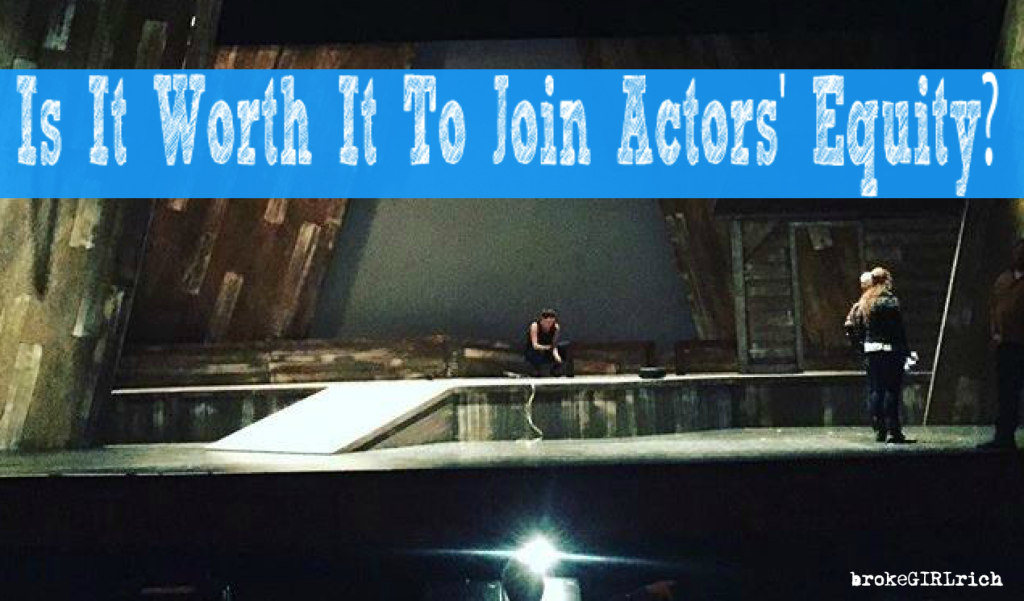Let me lay a few cards on the table here. I don’t think Actors’ Equity is a good union. I say this from the standpoint of someone who has turned down three different jobs that would’ve allowed her to join – not as someone who hasn’t been able to get in.
That being said, a good friend of mine who is currently looking for work was offered a gig that would get her an Equity card and I could completely understand her excitement and wished her will with the whole venture.
Equity is an incredibly difficult union to get into. There’s the perpetual catch 22 of you need to be in the union to get the union gigs but to get into this union, you need to either be offered one of those gigs or work a bunch of hours as an apprentice for really terrible pay.
I guess I just have a biased view of how I think unions should work because of my time as a production manager working in an IATSE house. Want to talk about a strong union – IATSE is a powerhouse in the arts. It’s still difficult, though not nearly as difficult as Equity, to get in.
They pay their members a living wage. There are a lot of IATSE jobs.
Equity does this great thing where you have to work a certain number of weeks a year to qualify for healthcare. This can often mean you take work in Middle-of-Nowhere, Idaho for a few weeks at a huge pay cut to make sure you get your weeks in. It can mean you take showcase codes, which are the most abused thing I’ve ever seen, to get to that minimum week number.
Showcase codes were created to help tiny theater companies be able to produce a small work long enough to showcase it to help get it properly produced. In New York City, the showcase code is often abused into a full run of a real show, requesting a stage manager to work a full time, 40+ hour a week gig, for several weeks at a time for a stipend of around $200.
The easiest way to stop showcase codes onlinepharmacies247.com would be for qualified stage managers to stop taking the work. But in NYC, it’s a fierce fight to even get that work. So the only real way they would be stopped would be if the union stepped in and actually regulated these things.
In IATSE, you can also take non-union work with the understanding that you’re just not protected while you’re over there doing it. In Actors’ Equity, despite not having enough jobs to go around, you’re penalized if you try to work outside the union.
The majority of Equity stage managers I know are actually baristas or dog walkers or substitute teachers, who just squeak by on gigs each year to manage to stay in the union.
Equity was really developed to help stage managers at the Broadway level, not below it. If your goal isn’t only to work on Broadway, there’s very little reason to join the union.
I’ve also been surprised at how behind the times Equity is. I understand the history of stage managers, how many transitioned from being actors into the gig, and that’s why stage managers are a part of Actor’s Equity; however, this really isn’t the case anymore. To be a more useful tool to the next generation, we really need to move to IATSE. How many jobs, especially for younger stage managers, require you double in a technical field like sound or lights? Quite a few and Equity isn’t in a position to offer any training or job skill courses that will help younger members gain those skills.
Heck, it’s not even younger stage managers. When I toured with Mills Entertainment, I was making a healthy $900+ a week, and I doubled as the lighting director.
I’m not knocking anyone who has gotten their card – and I think it’s even a big deal to be celebrated – because it is hard to achieve. But I’m writing this as a caution to stage managers who haven’t gotten their card yet – make sure you think through whether or not this will actually help your career, because there’s a good chance it may not.
Unless we can get IATSE to take us – then I’d be all in.





No, the only “union” job I ever had was as a teacher and I chose to join (we are a right to work state) because I didn’t think it was fair to reap the benefits of the union negotiating without paying the dues. I don’t know if I would have gone out on strike if it had come to that .
It seems to me that in professions where the norm is to jump from job to job, the union could play an important role for both employer and employee as a provider of labor for the employer and as a provider of employee benefits and job leads for the employee, but I’m not sure how many of them actually do that.
RAnn recently posted…Should I Buy Insurance?